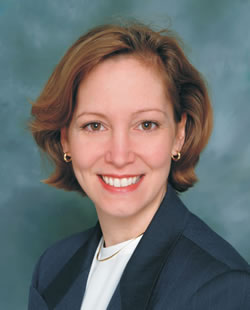Remarks by the APS Director of International Affairs
Amy Flatten

The partnership between the APS International Office and the many volunteers from the Forum on International Physics (FIP) has strengthened the Society’s efforts to serve the international physics community. Consequently, I often use this first issue of the FIP newsletter each year to reflect on some of our past accomplishments.It reminds us of how much we can achieve together, and hopefully, invigorates us to push forward new initiatives for the upcoming year.
This past year, the Society partnered with the physical societies across North America for the biennial Canadian-American-Mexican Physics Graduate Student Conference (CAM) jointly sponsored by the American Physical Society (APS), the Canadian Association of Physicists (CAP), and the Sociedad Mexicana de Física (SMF). CAM2013 was held in Waterloo, Canada and promoted international networking, career development, and encouraged collaborations among North America’s physics graduate students. FIP Executive Committee members contributed to the meeting as invited speakers and student mentors.
For the first time in its history, APS held its Executive Board Retreat outside of the United States. The retreat was held at Chicheley Hall, home of the Kavli Royal Society International Centre, just outside of London, United Kingdom and enabled the leaders of the European Physical Society (EPS), the UK Institute of Physics (IOP), and the German Physical Society (DPG) to discuss new strategies for expanding APS collaboration with European partners. Likewise, the APS also partnered with EPS, IOP, and DPG in the SESAME Travel Award Program that supports training opportunities for scientists in the Middle East. The SESAME project--the synchrotron light source in Amman, Jordan, will bring together scientists for research collaboration from countries with strained political relations. SESAME is an outstanding example of science for diplomacy and I believe FIP members would enjoy reading more about it.
This past year, the APS continued its partnerships with the Indo-US Science and Technology Forum (IUSSTF) and the Sociedade Brasileira de Física (SBF) to offer the Brazil & India Physics Student, Post-doc & Professor Exchange Programs. These Physics Student Exchange Programs offered graduate students opportunities to attend a short-course or summer institute in another country, or work overseas with a professor in his/her field of study. The Professorship/Lectureship Exchange Programs funded physicists wishing to teach a short course or deliver a lecture series in the other country. These programs were highlighted in the last FIP Newsletter and I wish to remind readers that we issue a call for proposals twice each year (fall and spring). I encourage FIP members to apply themselves, and also to encourage their students and post-docs to apply as well. More information is available at the Brazil-U.S. Exchange Program page and also on the U.S.-India Travel Grant Program page.
In partnership with the UK Institute of Physics (IOP) and the Abdu Salam International Centre for Theoretical Physics (ICTP), the Society continued to co-sponsor workshops designed for physicists and engineers from developing countries who are interested in learning entrepreneurial skills. This past year, two such workshops were held in Durban, South Africa and Chiapas, Mexico.
The Society also partnered with other organizations toward the AAAS Science and Human Rights Coalition--a network of professional societies providing strengthened connections between the human rights and scientific communities. Through this Coalition, the APS stressed the need for scientific organizations to advocate for the human rights of scientists in the US and around the world. More information on this important network can be found at the Science and Human Rights Coalition page.
The Society continues to bring international physicists to speak at APS meetings through both the Marshak and Beller Lectureships, which support distinguished physicists from the developed and developing countries respectively. In 2013, the Marshak Lectureship was awarded to a FIP nominee, Lilia Meza Montes of the Universidad de Puebla, Mexico. Montes delivered her talk, “Women in Physics: Increasing in number, and what else?” at a 2013 March Meeting session organized by the Forum on International Physics titled “Recent Advances in Condensed Matter in Latin America.” More on this honor can be found on the Marshak Lectureship page.
The Society also continued its ongoing commitment to developing country physicists through its International Travel Grant Award Program (ITGAP), which supports developing scientists’ travel to visit collaborators in developed countries. The Forum on International Physics launched this program with its initial seed money in 2004. Today, nearly 10 years after its initial awards, the program has grown to include support from nearly every scientific Division of the APS. Please learn more about this program at the International Travel Grant Award Program page.
The examples above are just a few of the activities of the past year. You can learn more about how we can help APS members with visa issues and our other initiatives at the International Affairs web page. We have exciting plans underway for this upcoming year and I look forward to working with FIP to bring them to fruition.
In the meantime, I will conclude with a sincere thanks to FIP for its ongoing partnership with the APS International Office. This February 2014, I will have reached my 10-year anniversary as Director of International Affairs, and since my earliest days in this role, it has been my privilege to collaborate with FIP toward developing a portfolio of ongoing, sustainable, international programs that serve APS members and our physics colleagues around the world.
Dr. Amy Flatten is Director of International Affairs at the American Physical Society.
Disclaimer - The articles and opinion pieces found in this issue of the APS Forum on International Physics Newsletter are not peer refereed and represent solely the views of the authors and not necessarily the views of the APS.
